Google vs Baidu - The New CIC Survey
The new company founded by the famous Chinese internet analyst Bowang Lu (former name Weigang Lu), CIC, published it's first research report for Chinese search engine survey. The report highlighted the fact that Google's market share has fallen 12.3% in the last year.
Following are parts of the report:
Definition for search engine market share: Method 1, we continue to use first choice to decide market share; Method 2, when a user uses more than one search engine, a weighted percentage was used as modification for method 1; Method 3, we use which search engine the user was using on a random day of being interviewed and the frequency the user uses that search engine for market share definition.
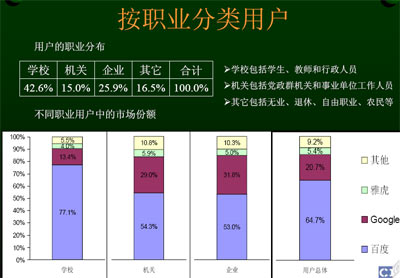 Fig 1. Among all users, 42.6% are students and teachers, 15.0% are from government offices, 25.9% are enterprise users, 16.5% are from others.
Fig 1. Among all users, 42.6% are students and teachers, 15.0% are from government offices, 25.9% are enterprise users, 16.5% are from others.
Among school users, 77.1% use Baidu, 13.4% use Google
Among office users, 54.3% use Baidu, 29% use Google
Among enterprise users, 64.7% use Baidu, 31.0% use Google
For all users, 64.7% uses Baidu, 20.7% use Google
(Due to fact that all the other search engines have share in single digit, their numbers are not being translated here)
 Fig 2. Among all enterprise users, 29.8% from government owned firms, 42.9% from private firms, 21.0% from foreign capital invested firms, and 6.3% from others.
Fig 2. Among all enterprise users, 29.8% from government owned firms, 42.9% from private firms, 21.0% from foreign capital invested firms, and 6.3% from others.
Among users from government owned firms, Baidu's share was 54.7%, Google 25.0%
Among users from private owned firms, Baidu's share was 54.0%, Google 32.8%
Among foreign capital invested firms, Baidu's share was 44.8%, Google 44%
For all enterprise users, Baidu's shae was 52.7%, Google 32.0%.
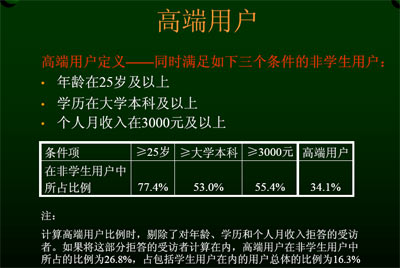 Fig 3. High end user are defined as those non-student users who are also aged 25 and above(77.4%), with college degrees(53.0%), and earns monthly salary higher than 3000 yuan(55.4%). The percentage of those met all the high-end criterions was 34.1% among all users.
Fig 3. High end user are defined as those non-student users who are also aged 25 and above(77.4%), with college degrees(53.0%), and earns monthly salary higher than 3000 yuan(55.4%). The percentage of those met all the high-end criterions was 34.1% among all users.
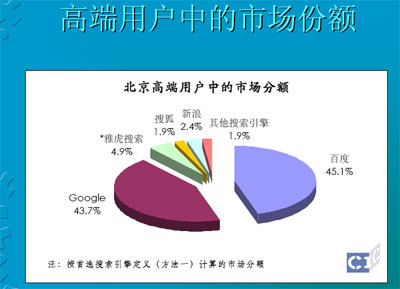 Fig 4. Among all high-end users, Baidu took the largest piece of the pie at 45.1%, Google 43.7%
Fig 4. Among all high-end users, Baidu took the largest piece of the pie at 45.1%, Google 43.7%
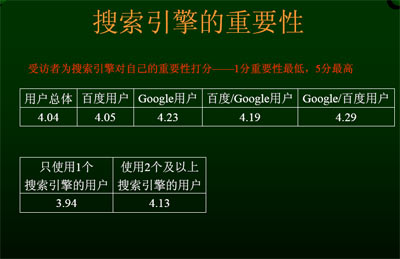 Fig 5. Search engine dependency. All users are asked to rate the importance of using a search engine, with 5=most, and 1=least
Fig 5. Search engine dependency. All users are asked to rate the importance of using a search engine, with 5=most, and 1=least
All users, 4.04; Baidu users, 4.05; Google users, 4.23; Baidu/Google dual users, 4.19; Google/Baidu dual users 4.29
Single search engine users, 3.94; multiple search engines users, 4.13
 Fig 6. User satisfaction
Fig 6. User satisfaction
All users, Baidu 4.09; Google 4.06
Student users, Baidu 4.20; Google 4.02
Non-student users, Baidu 4.02; Google 4.09
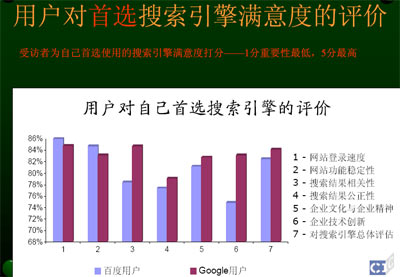 Fig 7. User satisfaction categories for their first choice search engine
Fig 7. User satisfaction categories for their first choice search engine
1. landing speed, Baidu higher
2. website stability, Baidu higher
3. search result relevancy, Google much higher
4. search result justification, Google higher
5. business culture and conduct, Google higher
6. technology innovations, Google much higher
7. overall impression, Google higher
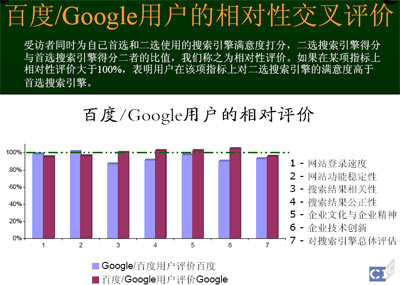 Fig 8, Cross comments regarding their second choice search engine
Fig 8, Cross comments regarding their second choice search engine
Blue comments are views on Baidu from Google/Baidu dual users
Red comments are views on Google from Baidu/Google dual users
(the figures are pretty much fit those from Fig 7 except that Baidu-preferred users are less impressed by Google's search result relevancy and technological innovations)
 Fig 9. Baidu improvements:
Fig 9. Baidu improvements:
1. Maturing into an overall service of search
In 2005 CNNIC survey, 49.1% Baidu users searched for the web, 55.8% searched for MP3
61.7% Google users searched for the web, 17.3% search for MP3
In this year's CIC survey, 72.6% Baidu users searched for the web, 55.5% search for MP3
76.9% Google users searched for the web, 11.9% searched for MP3
(Google does not provide specialized MP3 search service like the one Baidu provides)
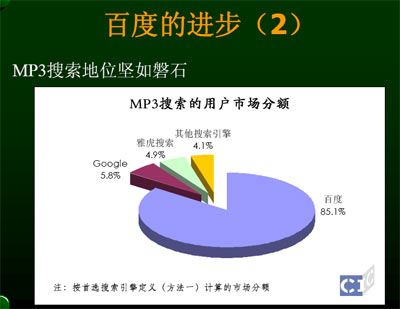 Fig 10. Baidu's improvements:
Fig 10. Baidu's improvements:
2. Baidu's MP3 gained rock solid leadership at 85.1%
 Fig 11. Baidu's improvements:
Fig 11. Baidu's improvements:
3. Market share increased from both student and non-student users; Started to captured Google's core users and shaking Google's position in high-end user market
 Fig 12. Google's core users
Fig 12. Google's core users
Google users are still carry the social marks of higher education level and higher income, but some are migrating to Baidu and could be serious challenge for Google.
However, the satisfaction level and regards of technology innovations still make Google way ahead of Baidu.
Google's users' overall internet experience, search engine dependency, job related searches are all way ahead of Baidu users.
 Fig 13. Google vs Baidu
Fig 13. Google vs Baidu
users access net earlier than 2000, Baidu 42.5%; Google 67.1%
users access net earlier than 2002, Baidu 39.3%; Google 58.9%
users installed and using toolbar, Baidu 35.6%; Google 50.6%
Purposes of using search engine:
Study related searches, Baidu 34.8%; Google 45.3%
Professional related searches, Baidu 64.5%; Google 83.3%
Leisure related searches, Baidu 76.7%; Google 70.9%
Living and health related searches, Baidu 44.7%; Google 52.2%

Fig 14. Beijing residents most frequently visited websites
For first landing choice:
Sina still leads at number 1. Baidu replaced Sohu at number 2. Sohu number 3. Netease number 4.
Yahoo.China and Google tied at number 5.
For most frequently visited:
1. Sina; 2. Sohu; 3. Baidu; 4. Netease; 5. Yahoo; 6. Google
Which site visited yesterday:
1. Sina; 2. Baidu; 3. Sohu; 4. Netease; 5. Yahoo; 6. Google
translated from Chinese source: it.sohu.com
Following are parts of the report:
Definition for search engine market share: Method 1, we continue to use first choice to decide market share; Method 2, when a user uses more than one search engine, a weighted percentage was used as modification for method 1; Method 3, we use which search engine the user was using on a random day of being interviewed and the frequency the user uses that search engine for market share definition.
 Fig 1. Among all users, 42.6% are students and teachers, 15.0% are from government offices, 25.9% are enterprise users, 16.5% are from others.
Fig 1. Among all users, 42.6% are students and teachers, 15.0% are from government offices, 25.9% are enterprise users, 16.5% are from others.Among school users, 77.1% use Baidu, 13.4% use Google
Among office users, 54.3% use Baidu, 29% use Google
Among enterprise users, 64.7% use Baidu, 31.0% use Google
For all users, 64.7% uses Baidu, 20.7% use Google
(Due to fact that all the other search engines have share in single digit, their numbers are not being translated here)
 Fig 2. Among all enterprise users, 29.8% from government owned firms, 42.9% from private firms, 21.0% from foreign capital invested firms, and 6.3% from others.
Fig 2. Among all enterprise users, 29.8% from government owned firms, 42.9% from private firms, 21.0% from foreign capital invested firms, and 6.3% from others.Among users from government owned firms, Baidu's share was 54.7%, Google 25.0%
Among users from private owned firms, Baidu's share was 54.0%, Google 32.8%
Among foreign capital invested firms, Baidu's share was 44.8%, Google 44%
For all enterprise users, Baidu's shae was 52.7%, Google 32.0%.
 Fig 3. High end user are defined as those non-student users who are also aged 25 and above(77.4%), with college degrees(53.0%), and earns monthly salary higher than 3000 yuan(55.4%). The percentage of those met all the high-end criterions was 34.1% among all users.
Fig 3. High end user are defined as those non-student users who are also aged 25 and above(77.4%), with college degrees(53.0%), and earns monthly salary higher than 3000 yuan(55.4%). The percentage of those met all the high-end criterions was 34.1% among all users. Fig 4. Among all high-end users, Baidu took the largest piece of the pie at 45.1%, Google 43.7%
Fig 4. Among all high-end users, Baidu took the largest piece of the pie at 45.1%, Google 43.7% Fig 5. Search engine dependency. All users are asked to rate the importance of using a search engine, with 5=most, and 1=least
Fig 5. Search engine dependency. All users are asked to rate the importance of using a search engine, with 5=most, and 1=leastAll users, 4.04; Baidu users, 4.05; Google users, 4.23; Baidu/Google dual users, 4.19; Google/Baidu dual users 4.29
Single search engine users, 3.94; multiple search engines users, 4.13
 Fig 6. User satisfaction
Fig 6. User satisfactionAll users, Baidu 4.09; Google 4.06
Student users, Baidu 4.20; Google 4.02
Non-student users, Baidu 4.02; Google 4.09
 Fig 7. User satisfaction categories for their first choice search engine
Fig 7. User satisfaction categories for their first choice search engine1. landing speed, Baidu higher
2. website stability, Baidu higher
3. search result relevancy, Google much higher
4. search result justification, Google higher
5. business culture and conduct, Google higher
6. technology innovations, Google much higher
7. overall impression, Google higher
 Fig 8, Cross comments regarding their second choice search engine
Fig 8, Cross comments regarding their second choice search engineBlue comments are views on Baidu from Google/Baidu dual users
Red comments are views on Google from Baidu/Google dual users
(the figures are pretty much fit those from Fig 7 except that Baidu-preferred users are less impressed by Google's search result relevancy and technological innovations)
 Fig 9. Baidu improvements:
Fig 9. Baidu improvements:1. Maturing into an overall service of search
In 2005 CNNIC survey, 49.1% Baidu users searched for the web, 55.8% searched for MP3
61.7% Google users searched for the web, 17.3% search for MP3
In this year's CIC survey, 72.6% Baidu users searched for the web, 55.5% search for MP3
76.9% Google users searched for the web, 11.9% searched for MP3
(Google does not provide specialized MP3 search service like the one Baidu provides)
 Fig 10. Baidu's improvements:
Fig 10. Baidu's improvements:2. Baidu's MP3 gained rock solid leadership at 85.1%
 Fig 11. Baidu's improvements:
Fig 11. Baidu's improvements:3. Market share increased from both student and non-student users; Started to captured Google's core users and shaking Google's position in high-end user market
 Fig 12. Google's core users
Fig 12. Google's core usersGoogle users are still carry the social marks of higher education level and higher income, but some are migrating to Baidu and could be serious challenge for Google.
However, the satisfaction level and regards of technology innovations still make Google way ahead of Baidu.
Google's users' overall internet experience, search engine dependency, job related searches are all way ahead of Baidu users.
 Fig 13. Google vs Baidu
Fig 13. Google vs Baiduusers access net earlier than 2000, Baidu 42.5%; Google 67.1%
users access net earlier than 2002, Baidu 39.3%; Google 58.9%
users installed and using toolbar, Baidu 35.6%; Google 50.6%
Purposes of using search engine:
Study related searches, Baidu 34.8%; Google 45.3%
Professional related searches, Baidu 64.5%; Google 83.3%
Leisure related searches, Baidu 76.7%; Google 70.9%
Living and health related searches, Baidu 44.7%; Google 52.2%

Fig 14. Beijing residents most frequently visited websites
For first landing choice:
Sina still leads at number 1. Baidu replaced Sohu at number 2. Sohu number 3. Netease number 4.
Yahoo.China and Google tied at number 5.
For most frequently visited:
1. Sina; 2. Sohu; 3. Baidu; 4. Netease; 5. Yahoo; 6. Google
Which site visited yesterday:
1. Sina; 2. Baidu; 3. Sohu; 4. Netease; 5. Yahoo; 6. Google
translated from Chinese source: it.sohu.com

0 Comments:
Post a Comment
Subscribe to Post Comments [Atom]
<< Home